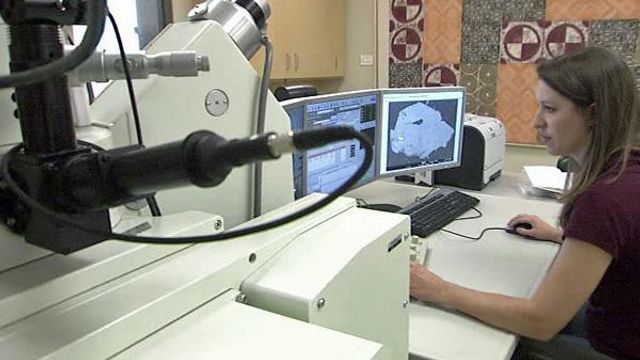Crime-fighting hyperprobe boosts FSU's science program
Fayetteville State University is home to a state-of-the-art piece of equipment: the hyperprobe, a high-powered microscope that does much more than magnify an object and has attracted the attention of law enforcement.
Posted — Updated“The hyperprobe is probably one of the most technologically advanced pieces of equipment that humans have ever made,” said Dr. Steven Singletary, Fayetteville State University faculty member.
Singletary was instrumental in bringing the hyperprobe to FSU last November.
“It's a microscope where we've taken the light bulb and the lenses away,” Singletary explained. “We've replaced them with a beam of electrons and electromagnets, and essentially what that does is allow us to magnify things up to 300,000 times.”
The equipment can detect what a sample is actually made of.
“We can tell you exactly not only what is in there, but how much of it is in there,” Singletary said.
The microscope is one of only three like it in the world.
“I use it to analyze meteorites in my research. I've analyzed paint chips for lawyers. I've analyzed teeth for dentists,” Singletary said.
The machine even helped convict a suspect in a Raleigh homicide case, according to geologist Heather Hanna.
Anthony Markice Bowling, 18, of Raleigh, was killed in 2008. His body was found in a wooded area off the 4800 block of Thornton Commons Drive. Hanna was asked to analyze soil found on suspect Jordan Glenn Peterson's clothing and compare it to soil from the crime scene.
“They are chemically consistent with each other, but chemically different from the composition of mica from other areas around Raleigh,” Hanna said of her analyst.
So, in terms of the evidence, “the suspect was present at the crime scene,” Hanna said of her conclusion.
Singletary said the hyperprobe is not only a boost for the science program, but it puts the university in the same company as some of the top research facilities in the nation.
“We have students who have the mental ability to do the same type of work that people are doing at MIT, they're doing at UCLA, but they don't have the equipment to do it,” he said.
Singletary said the hyperprobe has fulfilled that void.
The hyperprobe was made possible through a $1.5 million federal grant. It will be featured Wednesday during FSU's "Science Night" in the Lyons Science Building.
• Credits
Copyright 2024 by Capitol Broadcasting Company. All rights reserved. This material may not be published, broadcast, rewritten or redistributed.





